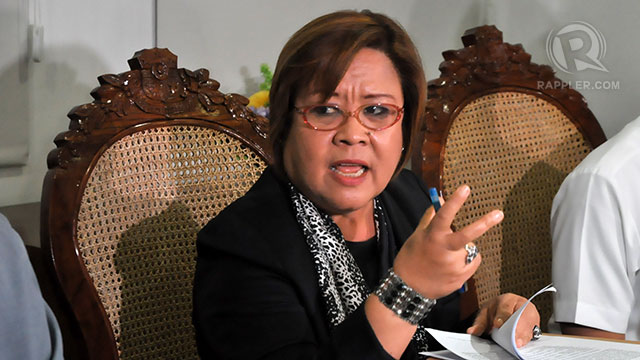SUMMARY
This is AI generated summarization, which may have errors. For context, always refer to the full article.

MANILA, Philippines – While raid operations are constantly carried out to rescue victims and arrest perpetrators, anti-trafficking authorities have to contend with limited resources. (READ: NBI: Online sex trade cottage industry in PH)
Department of Justice (DOJ) Secretary Leila de Lima said on Friday, January 17, efforts to curb the internationally condemned cash-for-cybersex scheme in the country are well supported logistically but resources are not enough.
“Lagi namang kulang ang resources in terms of law enforcement, but there’s always been continuous support logistically,” she said in an interview with reporters.
(Resources in terms of law enforcement are always not enough, but there’s always been continuous support logistically.)
De Lima’s pronouncement came on the day a lawmaker called on the justice department to strictly implement existing anti-trafficking and child protection laws.
Effective implementation needed
Senator Loren Legarda on Friday urged the DOJ and other member-agencies of the Inter-Agency Council Against Trafficking (IACAT) to beef up their efforts.
IACAT is tasked with ensuring the recovery, rehabilitation and reintegration of trafficked persons into the mainstream of society. The member-agencies Legarda addressed in her statement were the National Bureau of Investigation and the Department of Social Welfare and Development.
Legarda regarded the troubling and growing cybersex industry as “another storm brewing in the country.”
“We ensured the passage of the Expanded Anti-Trafficking in Persons Act to strengthen our legal defenses against individuals and syndicates involved in the illegal human trade. The stricter provisions of the law should be matched with its effective implementation,” said Legarda.
Importance of cybercrime law
De Lima added that the DOJ cybercrime unit couldn’t go on “full blast,” as it awaits the Supreme Court (SC) ruling on the country’s cybercrime law.
“May office tayo for cybercrime dito sa DOJ, although hindi pa maka-full blast ang Office for cybercrime. Pero hinihintay natin ang decision ng SC sa Cybercrime Prevention Act,” she explained.
(We have an Office for Cybercrime here at DOJ, although we can’t go full blast. But we are waiting for the decision of the Supreme Court on the Cybercrime Prevention Act.)
The law – which penalizes cybersex and child pornography – was temporarily halted by the SC a month after it was signed into law, following controversial provisions on libel.
On Thursday, January 16, Presidential Communications Operations Office Secretary Sonny Coloma also said the international joint investigation on a Philippine cybersex ring highlights the importance of the Cyber Crime Prevention Law.
Continued efforts
De Lima stressed that the IACAT had long been involved in cybersex bust operations, even before reports on the joint probe of a pedophile ring in the Visayan region hit international headlines.
“This is not something we addressed only now… We have been doing this all along, pero nakakatulong na may intensified effort from foreign authorities,” she said. (We have been doing this all along, but it helps that there is an intensified effort from foreign authorities.)
The Palace, through Coloma, said a day earlier that “the government has already committed itself to doing everything that needs to be done through inter-agency effort, through legislation, and through other administrative measures to stop this trafficking.”
“This is a matter of high priority for our government that is not prompted by recent media reports,” he said. “I would like to emphasize that our government is determined to stop human trafficking in all its forms and manifestations through concerted action by all concerned government agencies in cooperation with other countries.”
IACAT, in a press briefer, said it is “well aware of the emerging threat that these cybercrimes pose, especially in developing countries.” – Rappler.com
Add a comment
How does this make you feel?
There are no comments yet. Add your comment to start the conversation.